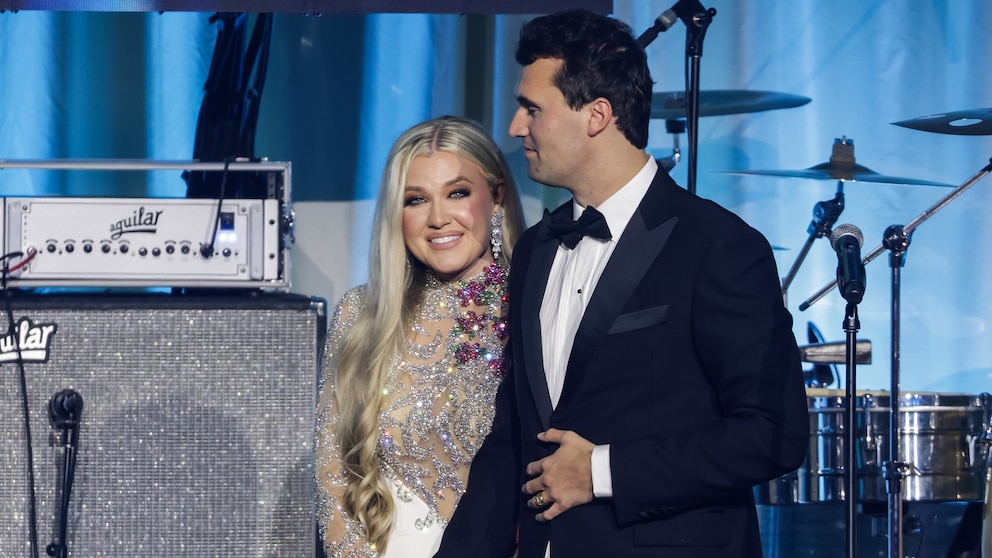Erika Kirk publicly forgives the man suspected of killing her husband Charlie Kirk, citing her Christian faith and her late husband’s values, offering a profound message of grace and resilience amid ongoing investigation and national attention.

In a statement that has shocked and moved the nation, Erika Kirk publicly declared that she forgives the man suspected of killing her husband, political commentator Charlie Kirk, saying, “I forgive him because it was what Christ did.
And it is what Charlie would do.
” The announcement came during a private memorial service held earlier this week in Chicago, where family, friends, and close associates gathered to honor the late conservative activist who had founded Turning Point USA and influenced millions of young Americans.
The circumstances surrounding Charlie Kirk’s death remain under investigation, with local authorities confirming that a suspect has been identified but details of the case are being withheld pending further inquiry.
While police have not released the identity or motive of the suspect, Erika Kirk’s statement adds a deeply personal and spiritual dimension to the tragedy, reflecting her faith and her commitment to forgiveness despite unimaginable loss.
Witnesses at the service described Erika as composed yet visibly emotional as she addressed attendees.
“She spoke with a calm authority that you could feel in the room,” said one family friend.
“Her message wasn’t about anger or revenge; it was about grace and honoring the memory of her husband in a way that reflects both faith and love.
” Attendees say Erika paused several times to collect herself before continuing, and her words drew tears and hushed murmurs from those gathered.
Erika Kirk’s statement also underscores the couple’s long-standing devotion to their shared Christian values.
Friends and colleagues recall Charlie as someone who frequently spoke about the importance of compassion, faith, and forgiveness in both personal and public life.
“He would have wanted peace, not vengeance,” said a former colleague at Turning Point USA.
“Erika’s words are a reflection of the life they lived together and the principles they stood for.”

The announcement comes amid a wave of national attention surrounding the case, with social media and news outlets speculating about the circumstances of Charlie Kirk’s death and the identity of the suspect.
Erika’s message of forgiveness has sparked widespread discussion online, with supporters praising her strength and faith, while some commentators debate the implications of forgiving someone accused of such a grave act.
In her statement, Erika also addressed the public directly, emphasizing that her forgiveness is not a legal judgment but a moral and spiritual choice.
“This doesn’t mean I don’t want justice,” she said, according to sources familiar with the memorial.
“It means that in my heart, I release anger and seek peace, because that is what my husband would have wanted, and what Christ teaches us to do.”
Experts on grief and trauma note that such acts of forgiveness in the immediate aftermath of violent loss are rare but can play a critical role in the survivor’s emotional healing.
Dr.Helena Torres, a psychologist specializing in trauma, explained, “Forgiveness in this context is a profoundly personal act.
It doesn’t negate the need for justice or accountability, but it allows the bereaved to regain a sense of agency over their own emotional response to a traumatic event.”

Authorities have confirmed that the investigation into Charlie Kirk’s death is ongoing.
While details remain sparse, police have assured the public that they are following all leads and evidence, and that updates will be provided when available.
In the meantime, Erika Kirk’s public forgiveness has drawn attention to the human dimension of the tragedy, highlighting the interplay between grief, faith, and moral conviction in the face of profound loss.
Charlie Kirk’s passing has reverberated across political and social circles, with leaders, commentators, and public figures expressing condolences and reflecting on his impact on conservative youth activism.
Messages of support to Erika and her family continue to pour in, both in person and through social media, demonstrating the wide-reaching influence Charlie Kirk had during his career.
As the investigation continues, Erika Kirk’s decision to forgive the man suspected of killing her husband stands as a striking example of faith and resilience, offering a poignant and controversial lens through which the public can understand the human consequences of tragedy, the complexities of forgiveness, and the enduring legacy of Charlie Kirk’s life and work.
This extraordinary act of grace amid grief is likely to remain a defining moment in the narrative surrounding Charlie Kirk’s death, one that will be remembered for its courage, spiritual conviction, and the challenging questions it raises about morality, justice, and human compassion in the wake of personal loss.